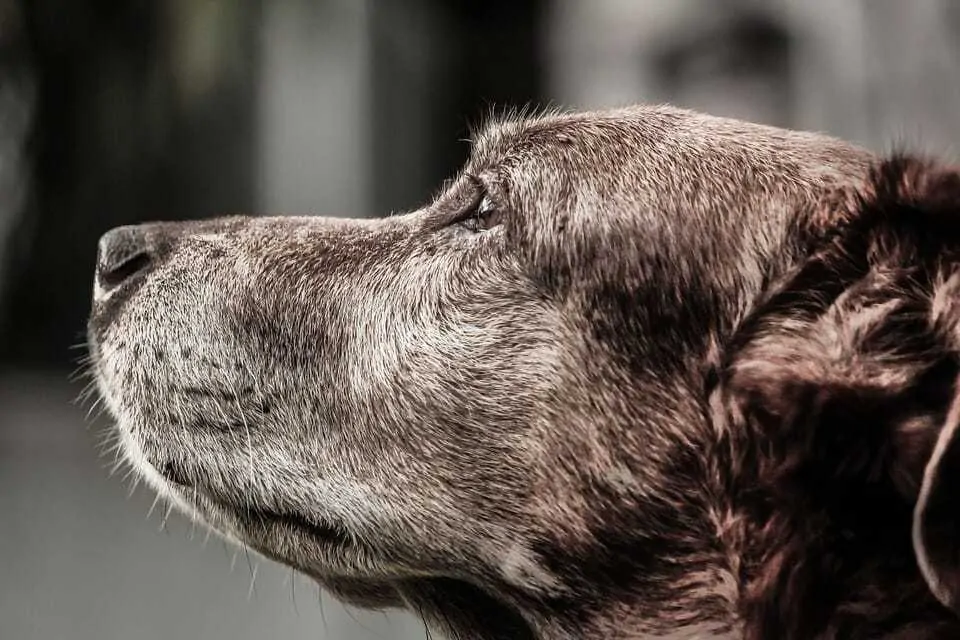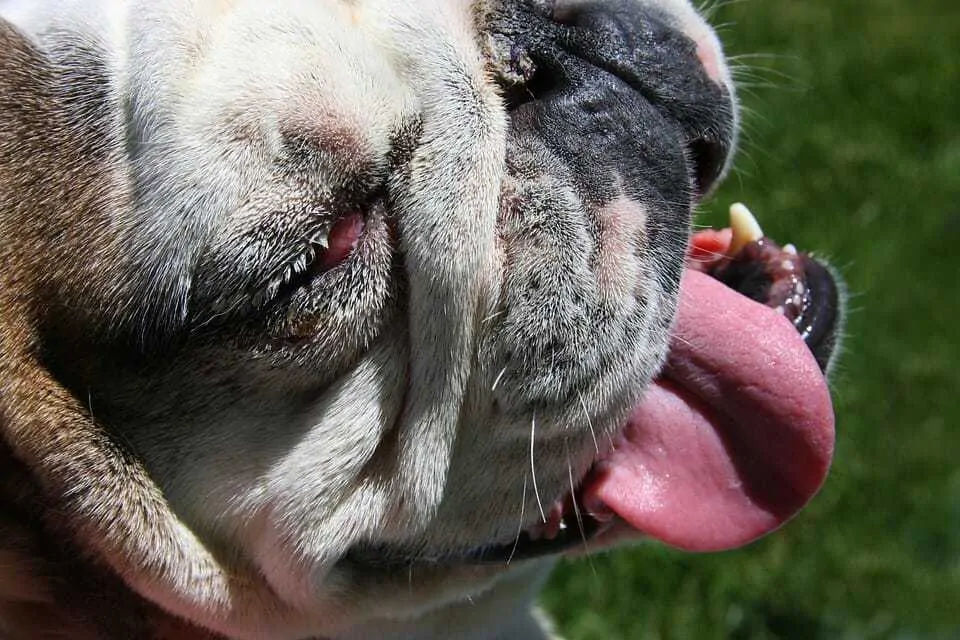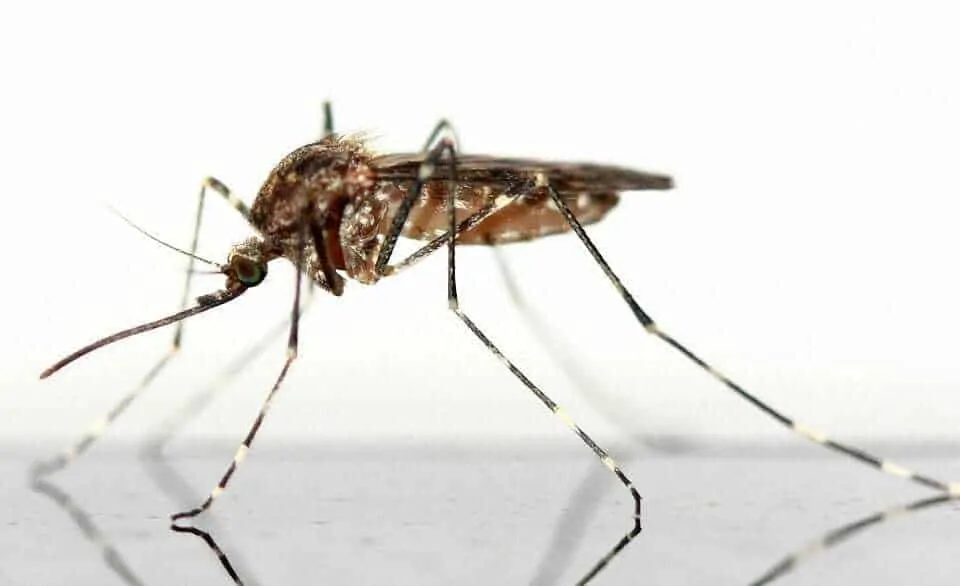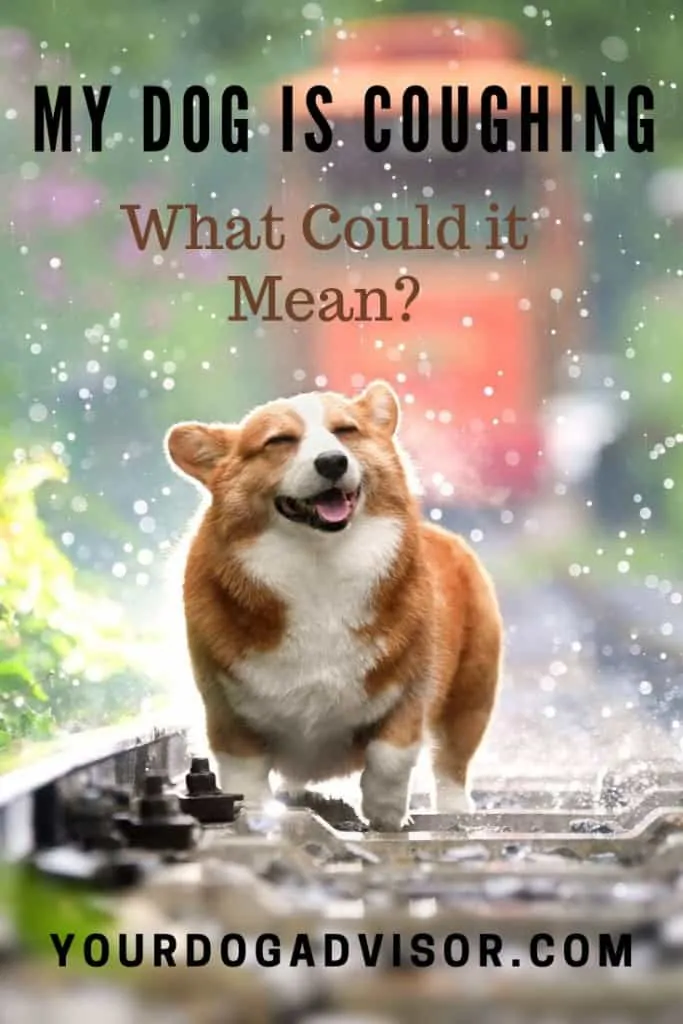Dog coughing? Don’t panic. Occasional coughing in dogs or a small cough is generally not something to worry about and even something more persistent will not always be serious and can often be very easily managed if prompt treatment is received.
At the same time, dog owners should not ignore a serious cough and it is important to seek advice from your vet to put your mind at ease or to establish what the cause of your dog’s cough could be.
A cough may not be anything sinister for your dog but it does need to be monitored and if it is serious or persistent then it is important to consult with a vet
Contents
What Kind of Dog Coughing?
It is important to pay attention to the type of cough that your dog is producing. This can have great bearing on working out what the cause might be. I am sure there are many vets that roll their eyes when owners try to impersonate their dog’s cough in an attempt to help the vet. If you are able to video the dog coughing this could be helpful but paying attention to the details can also be is the most helpful thing. It is important to consider the following so you can answer any questions your vet may have as accurately as possible:
How Does the Dog’s Cough Sound?
Is it dry hacking / a dry cough, is it a wet, productive cough with lots of mucus or discharge, is it a deep goose honking type of cough or is your dog frequently gagging?
What Is the Frequency of the Dog Coughing?
Is your dog coughing every few minutes, every half hour, just once a day? Are the dog coughing fits themselves prolonged or is it just one or two coughs at a time? Is the dog coughing even when asleep? Does the dog’s cough happen more during or after they have eaten? How many days have they been coughing for?
Any Accompanying Respiratory Issues of the Coughing in Dogs?
Is your dog also have difficulty breathing? Has the tone of their bark changed? Perhaps they are not able to vocalise so well or so loudly.
Is Your Dog Otherwise Well in Themselves?
Is your dog still full of energy and seems to be acting normally other than the cough or are they more sleepy than usual, more grouchy, less inclined to eat or drink?
If They Are Coughing up Matter, What Does It Look Like?
With your dog coughing is anything coming up? What is the colour and consistency of the phlegm or mucus? Is there any blood present?
Be Aware of the Risk of Passing a Contagious Virus to Other Dogs
It is important to remember that often dog coughing can be the sign of a virus or bacterial infection and this can mean there is a risk of passing something on to other dogs. If it is kennel cough or canine influenza virus this is highly contagious and, whilst most dogs recover from it very well, young puppies and elderly dogs can become very ill.
While establishing what the cough is, it is better to keep your dogs away from direct contact with other dogs to minimise the chance of the dog coughing passing anything on. This is especially important at facilities like daycare or boarding kennels where a virus can spread quickly.
If your dog has a cough that relates to a contagious virus then allowing them to have close contact with other dogs could be putting them at risk too
When Should You Consult Your Vet?
If your dog has a persistent cough, one that is very serious, one that is accompanied by other unusual symptoms then it is time to seek assistance from your vet. If your dog is coughing up blood or having breathing difficulties then getting an appointment as soon as possible is extremely important.
If you are at all concerned, don’t hold off, it is better to get the reassurance than to risk leaving things to get worse or to leave your dog in discomfort. With some of the more serious conditions, the earlier it is caught the better the possible prognosis.
Your vet will be able to perform a full physical exam and this will likely include listening to your dog’s chest and lungs, checking their temperature and possibly running some tests to make a diagnosis.
Check with your vet what they want you to do when you arrive. If it is suspected that your dog has a contagious condition they may ask you not to be in the waiting room or to enter through an alternative entrance.
Common Causes of Coughing in Dogs
It is important to remember that sometimes your dog will cough for a perfectly innocent reason. Perhaps their food or water has just gone down slightly unusually. It could be that there is something in the environment that has irritated their throat temporarily.
Coughs can be caused by a wide variety of conditions. Many of these are common and straightforward to manage. Some will go away without any treatment, some will require only minimal intervention and then there are less common conditions that have coughing as a symptom that can be more serious. While we have provided information on just some of the possible conditions that can be associated with having coughing as a symptom, it is important not to worry, jump to any conclusions or speculate until you have had the chance to consult with your vet.
Kennel Cough
Kennel Cough, or to use its medical name Bordetella bronchiseptica or infectious tracheobronchitis, is one of the most common conditions associated with coughing in dogs and it is highly contagious. If your coughing dog attends a daycare, has recently stayed at kennels or in a home with other dogs or goes out on a group dog walk or to play in a dog park, there is a high chance that this is what they have contracted.
It can be caused by a number of different strains of viruses or bacterium and it usually means your dog will have a deep, dry and honking cough, it can send owners into a panic as they think their dog may be choking on something.
Whilst it is highly contagious it is very rarely serious and although it can make your dog feel a little under the weather and the cough can be uncomfortable, it will usually pass relatively quickly (usually within 1 – 3 weeks).
If the cough is severe, your vet may be able to prescribe some meds that will help ease the discomfort.
While it is usually not serious; young puppies, elderly dogs and those with already compromised immune systems can be at more risk of it being more debilitating and, in rare cases, it can travel to the lungs and there is a chance of a more serious condition like chronic bronchitis or pneumonia developing.
It is important that you keep your away from other dogs whilst they are recovering from the virus to minimise the risk of spreading it.
It is possible to get your dog a Kennel Cough vaccine but it is important to remember that this will only protect your dog against certain strains of the virus, so it may help to minimise the risk but it is not a guarantee that they will not contract a form of the virus even if they have had the vaccine.
Some dog daycares, dog walkers and boarding kennels ask that dogs are vaccinated before visiting the facilities to help minimise any risk.
Puppies, dogs with already compromised immune systems and senior dogs are more at risk if they develop kennel cough
Throat Injury/Blockage
Another common reason for coughing can be if your dog has had something irritate their throat or that they have some sort of blockage. If they do have a blockage this can be serious and it is recommended that you see a vet as soon as possible.
If your dog has foreign objects stuck in their throat, you may see them start to gag or hack in an attempt to cough it back up. This can even happen if the object has passed through the throat successfully but it perhaps caused a scratch or another irritating or uncomfortable injury on its way down.
If you notice coughing immediately after your dog has been playing with a toy (especially if they have chewed it up at all), or after eating a chew or some other item, then it is important to seek help as this can cause problems with breathing and, if the item moves down into the stomach or intestine, there is also the risk of a blockage or internal injury.
To help minimise any risk, always choose safe, tough toys. A correctly sized Classic Kong stuffed with treats is a safer choice than softer toys or chews. It is important to supervise your dog too.
See our articles for more information on safer dog chews and also our ones on good interactive toys and on very tough toys for those power chewers.
If your dog has choked on a chew or other item or if they have had a chew scratch their throat this could cause coughing
Heart Problems
There are a wide variety of different kinds of heart disease, it is a complex issue. Many are very treatable if detected early enough though.
If the problem is severe then coughing can be one of the more obvious clinical symptoms of heart disease. You may often notice the coughing during or after a period of exercise or physical exertion, when your dog is lying down or after drinking water.
In congestive heart failure (where the heart is not able to pump effectively and fluid can start to build up around the lungs), coughing is often more noticeable when the dog is lying down.
If the heart disease is causing the organ to enlarge then this can obstruct the airways and can also lead to coughing.
It is important that you look at your dog’s general behaviour alongside the coughing so that you can try to provide your vet with as clear a picture as possible. Are they lethargic, do they get out of breath easily, what is their appetite level like? There are also certain breeds that are more prone to developing heart disease including Cavalier King Charles Spaniels, Dobermanns, Boxers, Golden Retrievers and Great Danes.
If your vet suspects an issue with your dog’s heart then they may need a chest x-ray, an electrocardiogram (to measure the electrical activity of their heart) or heart ultrasound. The sooner they have a diagnosis and receive treatment and intervention, the better the chance of a good long-term prognosis.
Tracheal Collapse
If your dog is frequently coughing in a manner that sounds like a goose honking then there is a possibility that they are suffering from tracheal collapse.
The trachea is the windpipe that ensures that enough air is being received into the lungs. If the windpipe becomes weakened or completely collapses it can cause breathing difficulties and this dry, deep, hacking cough can surface.
This is a condition that a dog can either be born with or it can develop as a result of injury or excessive pressure. This is a progressive condition and without appropriate intervention, this can become a serious problem. Whilst the condition cannot be cured, it can be successfully treated. Sometimes certain medicines, cough suppressants or supplements are prescribed, these can help to reduce inflammation, dilate the airways and help to suppress the cough. In serious cases, surgery may even be required.
It is more common in smaller dogs and there are also particular breeds that are more prone to this condition including Yorkshire Terriers, Chihuahuas and Pomeranians. If your dog is overweight this can make the condition worse. It can also be more pronounced when in hot weather, when exercising, when sleeping or if pulling against a collar. The cough often becomes worse or gagging can occur when eating or drinking.
As well as appropriate intervention from your vet, we would always recommend that a dog that pulls hard against a collar wears a harness to take the strain away from the neck and windpipe. Not only can this help dogs that already have tracheal collapse be more comfortable but it can sometimes even prevent the condition from occurring. Persistent pulling against a collar has been known to cause the problem in certain cases. See our article on recommended harnesses for more guidance on how to choose an appropriate one.
If your dog is overweight and this is exacerbating the condition then a weight loss programme will also be critical to improve your dog’s quality of life and ease of breathing. See our article on dog obesity for more guidance on successfully managing a weight loss programme.
Small breed dogs, those that pull excessively on a collar and obese dogs are all at increased risk of tracheal collapse. Using a harness and watching their waistline can help minimise the risk.
Canine Influenza
Canine Influenza (also known as Dog Flu) is a highly contagious respiratory viral infection. It is not anywhere near as common as Kennel Cough though. In its mild form, your dog may exhibit a wet cough, could lack energy and may not be so keen to eat. They may also have nasal discharge and eye discharge (this is usually caused by developing a secondary bacterial infection). It can last from anything from around one to three weeks.
In severe cases of Canine Influenza, your dog’s temperature will become extremely elevated and they can have increased respiratory problems and can often develop pneumonia. Immediate veterinary treatment should be sought so that appropriate treatment can begin. Antibiotics will only be used to treat any secondary bacterial infection, like pneumonia. They may also require anti-inflammatories and sometimes even require rehydration if their fever has caused them to become dehydrated.
Whilst there are vaccines for Canine Influenza, these will not cover all strains of the virus. It is important that if your dog is displaying any of the symptoms, or has a confirmed diagnosis, that you do not allow them contact with other dogs until they are fully recovered.
Symptoms of canine influenza can include nasal and eye discharge
Fungal Infection
Fungal infections do not just develop on the skin as many people most commonly associate them with doing. They can also infect your dog’s insides too.
There are a wide variety of fungal infections that your dog could be exposed to that may result in them coughing as a symptom. Blastomycosis, for example, if a fungal infection that is commonly contracted after the dog inhales the spores that cause them. The fungus can be found in rotten wood and wet soil (so in a lot of forested or marshland areas). It can also be found in bird droppings (as can the fungus Cryptococcosis), so if your dog likes to gobble it up it is best to try to keep them on a lead when you are in an area where there is a lot present. If you keep chickens, it is important you restrict your dog’s access to their coop area or wherever else there may be a lot of droppings.
As well as coughing, this infection can result in a fever, skin lesions and, in serious cases, it can cause blindness or seizures. It can be easily treated with antifungal medication though.
Stagnant water can harbour a lot of fungi and it is important to prevent your dog from accessing this too.
Laryngeal Paralysis
Whereas tracheal collapse is more commonly seen in small breed dogs, Laryngeal Paralysis is a condition that is more frequently seen in large breeds. Some of those more prone to this condition include Labradors, Setters, Newfoundlands and Golden Retrievers. It is a condition that some dogs can be born with but is more commonly seen in older dogs. While it is not an extremely common condition, it is one that can be very serious.
In this condition, the Larynx (voice box) muscles do not function properly and this usually results in your dog struggling with breath, making rasping sounds when inhaling or vocalising and often coughing. Your dog can start to become exercise intolerant and, in serious cases, you may notice their tongue or gums turning blue or gray because they are not getting enough oxygen. They may even collapse and, if left without treatment, it can result in death.
Your vet will usually need to examine your dog’s voice box under general anaesthetic to give a definitive diagnosis.
In mild cases, the condition can often be managed with a combination of anti-inflammatories and antibiotics and managing your dog’s exercise levels, particularly in hot weather.
In more severe cases surgery may be required but it does have a good success rate and dogs usually go on to have a good quality of life.
A dog with laryngeal paralysis will likely also be panting excessively and having other breathing issues along with the coughing
Distemper
While Canine Distemper is not nearly as common a virus as Kennel Cough is, it is a much more serious and potentially fatal condition that requires immediate veterinary attention.
The virus can result in a number of challenging symptoms. It can impact on the respiratory system and this is why coughing can often be evidenced. It can also impact on the gastrointestinal and nervous system.
If you notice that your dog is coughing and sneezing and they also have a heavy and thick mucus coming from their eyes and nose then this is a serious cause for concern. The symptoms may also include vomiting, diarrhoea, lethargy and a loss of appetite.
In serious cases, the virus can travel to the brain and this can result in neurological issues which may include tremors, shakes, tics or seizures.
Puppies, elderly dogs or those with an already compromised immune system are at greatest risk of the virus taking a serious hold.
There is a vaccine to prevent a dog contracting the virus but for those dogs that have it there is no cure and the treatment is only supportive to try to aid recovery. Often intravenous fluids will be administered along with antibiotics to help reduce the risk of problems occurring as a result of a secondary infection. For those dogs that survive the virus, there is a possibility of there being lasting neurological damage. This can sometimes be minimal but in serious cases consideration about the dog’s quality of life may need to be made.
It is crucially important that any dog with Distemper is kept away from contact with any other dogs to minimise the risk of spreading this highly contagious and extremely serious virus.
Heartworm
The heartworm parasite is transferred when a mosquito bites an infected animal. The animal will have the larval form of the parasite in their bloodstream and this is transferred to another animal when the mosquito then bites them. It can only be spread through the mosquito and is never transferred directly from host to host.
It is primarily transferred through canid hosts, so wolves, coyotes and foxes along with dogs and it is more of a problem in some states than others. In the South, it is very common in untreated dogs.
Prevention is always regarded as the best course of action with Heartworm as it is difficult to detect in its early stages and by the time the symptoms are obvious it can be very serious. Speak with your vet about the best course of treatment. Some are monthly and others can be administered every six months and there are ones that can be taken orally, topically as a spot on and even by injection.
Heartworm is usually classified into four stages of severity. During class one there will be no visible symptoms or just a very mild cough, in class two the cough can become persistent and you may notice that they start to struggle with their usual amount of exercise, in class three your dog may not manage their usual walks, their heart rate could become weaker, they will suffer weight loss, may have fainting spells and their belly can begin to swell as a result of the adult heartworm infestation, the cough will be very severe by this stage. If urgent and aggressive treatment is not sought by the time the dog reaches class four then death is eventually a certainty as a result of complete organ failure.
Heartworm is easy to identify through blood tests. Your vet may also conduct a radiograph, ultrasound or echocardiogram to further assess the severity of the case and any damage that has been caused.
Treatment is multifaceted. Your dog will need to be on restricted exercise as overexertion can exacerbate the damage. They may need to be crated for a period of time, depending on the severity of the case. See our article on crate training for guidance on helping your dog to settle if they ever have to be on crate rest. For class one to three, a drug to kill the adult worms will also likely be administered along with a preventative and antibiotics. In the most progressed and serious cases, surgery may be required and this can involve physically pulling the worms out (they can grow up to one foot long).
Dogs can contract heartworm, if untreated, through the bite of an infected mosquito and one of the symptoms is coughing
Cancer
If your dog has developed cancer in the lungs, respiratory tract or in or around the heart then one of the first symptoms you may notice is a cough. Coughing on its own is obviously not definitive though and it is important to observe your dog for signs of other symptoms.
Other symptoms could include, but are not limited to, a loss of appetite, weight loss, lethargy and as the condition progresses the cough could become chronic and there could be blood that is coughed up or in the urine or faeces.
The prognosis for treating cancer successfully will depend on the type, the severity and how quickly it is detected. Again, depending on the type and severity the treatment will vary and detailed discussion with your vet will be required to understand the implications for your dog, their quality of life and their the long term prognosis.
Reverse Sneezing
A reverse sneeze is not actually coughing but, if you don’t know what it is when it occurs, it can seem like this is what is happening. It can seem quite dramatic when it does occur and can cause some owners to panic. Most of the time it is actually not something that is serious but, if it is happening frequently, trying to work out what could be triggering it is a worthwhile exercise.
When a dog reverse sneezes they will usually stand up erect and they will breathe in deeply through their nose repeatedly in quick succession. They will usually grimace with their lips pulled back and the inhale usually means that the dog will likely snork in a loud and dramatic fashion (in a way that sounds like an unusual cough).
If your dog has an occasional bout of reverse sneezing, it is more than likely that they have just got some sort of irritant that they are trying to expel from behind the nasal passage.
If the reverse sneezing happens frequently over a prolonged period it could be that there is something stuck, that there is an infection or allergy and veterinary intervention may be required.
Generally though, although it can sound very dramatic and look rather extreme and like a violent coughing fit, it is usually nothing sinister.
Allergies
If your dog has an allergy that is impacting on the respiratory system, whilst most people associate allergies with sneezing, they can also cause your dog to cough. There can also sometimes be irritation to the skin and discharge from the eyes and nose and other breathing issues such as wheezing. Allergies can also, of course, impact gastrically and there could be a tummy upset and possibly even vomiting or diarrhoea.
Allergies can be environmental, food-related, parasitic, like those related to fleas, those that are inherited and more.
It can often be difficult to establish the cause of an allergy and sometimes a strict and lengthy process of elimination is required. Treatment is often through the use of anti-inflammatories, using topical solutions like anti-allergen shampoos or even sometimes a process of desensitization to the allergen through gradual exposure via an allergy injection serum. Sometimes it is just about ensuring that your dog is not exposed to the trigger for their allergy if this is possible.
Home Remedies for Kennel Cough and Other Non-Serious Conditions
Home remedies should NEVER be a solution for an undiagnosed, persistent cough or one that is accompanied by other symptoms. It is always imperative that you seek assistance from your vet in establishing the underlying.
If your vet has diagnosed a mild case of kennel cough, for example, they may agree that using a home remedy to soothe the cough until the virus passes could be helpful. Not all of them have scientific backing in terms of their efficacy but, providing they are safe to administer, owners often try them in the hope of providing additional comfort. Always check with your vet first though.
Some commonly administered home remedies that are used to help soothe your dog’s throat and cough and help with the general symptoms of kennel cough include the following:
Honey
Honey is probably the most commonly administered home remedy for a dog with a sore throat. It has soothing and antibacterial properties. Manuka Honey, the most expensive honey around, is the one that is believed to have the most beneficial antibacterial properties and it is also believed to have some antiviral, anti-inflammatory, antifungal and antiseptic properties too.
It can be given just as a spoonful (most dogs like the taste) or mixed into a tea or on their food, or even put into an interactive treat toy (if care is taken where you feed it).
Because of its high sugar quantity if it was given too regularly then there is a risk of it damaging their teeth or causing weight gain but, if it is only as an occasional remedy this should not be an issue.
Raw Honey is often recommended as this is the pure and unpasteurized version so its healing properties will be more pronounced. Raw Honey though, consequently, could carry more bacteria so generally it is recommended that it is not given to young puppies or those with compromised immune systems.
Honest Raw Honey is a well-reviewed and ethical product if you want to buy the honey in its pure form.
No products found.
Herbal Teas/Blends
Some people will boil up a herbal tea that has soothing properties to pour over their dog’s food or give them on its own if they will take it that way. Make sure that it is one that only has ingredients that are safe to give to your dog. Some options include licorice, peppermint, sage, eucalyptus and ginger root. These could also be mixed with honey to sweeten the taste if your dog will not take it on its own.
HomeoPet Nose Relief drops are a popular product which contain a blend of doggy safe herbs, which is often used for dogs with respiratory problems. It is believed to offer relief from congestion, runny noses, sneezes and with sinus relief. As always, we would recommend checking with your vet that it is appropriate to use this treatment.
No products found.
Probiotics
The early studies around probiotics and the anecdotal evidence is very strong for the benefits of Probiotics. They are designed to promote a healthy gut and they are believed to help promote a healthy immune system and aid in fighting off an infection.
Some people give their dogs probiotics as part of their regular routine or you can give them after your dog is recovering from an illness to try to help them feel better more speedily.
They come in a wide variety of formats, some as individual palatable chewy tablets, some as granules that go on your dog’s food.
The Purina Pro Plan FortiFlora Dog Probiotic Supplement is a popular and well-reviewed option and it comes in a granule format.
The PetVitalityPRO Probiotics are also well-reviewed and these are available in a palatable treat format.
No products found.
Coconut Oil
Coconut Oil is another popular natural remedy. Again there is little scientific data to back up the claims about its benefits but it has grown in popularity in recent years and there are lots of positive anecdotal accounts. Providing your dog does not have any allergy or intolerance to it then it is unlikely to do any harm. Care should be taken when first introducing it though as, if too much is given, it can cause a tummy upset so it should always be introduced in very small quantities to start with.
It is believed that the fatty acids contained in coconut oil may help to fight off the harmful bacteria and that is could have antiviral properties too.
If you do buy a tub of coconut oil it is also believed it may have other beneficial properties including promoting a healthy skin and coat and it can even be useful for using to prevent snowballing on coats in winter conditions.
Zesty Paws Coconut Oil For Dogs is a popular brand but you don’t have to buy a product specifically marketed for dogs.
No products found.
Using Soft Food
If your dog has a sore and irritated throat, just like when this happens with humans, it can be uncomfortable when swallowing and even when eating. If you feed your dog dry kibble this can be scratchy and hurt when they are trying to eat it. By soaking the food to make it softer or giving them wet food whilst their throat is sore it may help make things more comfortable.
Do be aware though that swapping their food type suddenly can upset some dogs tummy and this would not be great when they are already feeling unwell.
Steam Therapy
Steam is believed to help make breathing easier, it opens up the airways and can soothe a dry throat and can help decongest.
If your dog is happy to do this, bring them into the bathroom whilst you are having a shower or bath. Make sure that the windows and doors are closed so that a good amount of steam can build up. Do take care though that it is not so warm that it makes your dog uncomfortable or overheated.
You could even use a Humidifier and have it close to your dog’s bed area. This would be an expensive purchase for a one-off incident but it could be a worthwhile investment if your dog has an ongoing respiratory issue. Always check with your vet that this would be appropriate to use alongside any treatment they may be recommending to help manage the condition.
The TaoTronics Ultrasonic Humidifier is a popular and well-reviewed choice.
No products found.
Aromatherapy
Using essentials oils for aromatherapy, in a diffuser, for example, can sometimes be used to see if it may help ease any discomfort.
When using essential oils it is extremely important that you ensure that they are safe for use around dogs, that they are NEVER used in their undiluted format and that your dog is comfortable around the smell and that it is not overpowering them (remember they have an incredibly sensitive sense of smell). Always make sure that they do have the option to move into an area where the scent has not permeated to.
Peppermint Oil is believed to possibly help ease congestion and Eucalyptus Oil may also ease congestion and is believed to have antiseptic properties.
See our article on Essential Oils for more guidance on when and how it is appropriate to use them for dogs.
Hydration and Rest
Above all else, when your dog is getting over kennel cough or some other mild viral or bacterial infection that has affected your dog’s respiratory tract then it is important that you allow them the time to rest and recuperate and that you keep them well hydrated.
Hope this guide on dog coughing is helpful! It should help you identify the common causes of coughing in dogs.

Jen Jones is a professional dog trainer and behavior specialist with more than 25 years of experience. As the founder of ‘Your Dog Advisor’ and the ‘Canine Connection’ rehabilitation center, she applies a holistic, empathetic approach, aiming to address root causes rather than merely treating symptoms.
Well known for her intuitive and compassionate approach, Jen adopts scientifically-proven, reward-based methods, encouraging positive reinforcement over punishment. Jen specializes in obedience training, behavior modification, and puppy socialization. Her innovative methods, particularly in addressing anxiety and aggression issues, have been widely recognized. Jen has worked with many of the world’s leading dog behaviorists and in her free time volunteers with local animal shelters and rescue groups.








